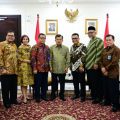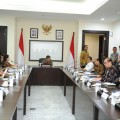Jakarta-wapresri.go.id As the host of the coming 2018 Asian Games, Indonesia puts a major concern in the aspect of achievement, infrastructure, and administration, with mainly adhering to the cost-effective principle.
“That is why in addition to the need to organize [the 2018 Asian Games] well, the holding of the event should also be cost effective in order not to have long-term effects [in the future],” said Vice President Jusuf Kalla when leading a follow-up meeting to prepare the 2018 Asian Games (AG) held at the Office of the Indonesian Olympic Committee (KOI) in Senayan, Jakarta, Saturday (March 25).
The Vice President further explained, as the council governing the organization of sport events in Asia, the Olympic Council of Asia (OCA) has applied the cost-effective principle and no extravagance in organizing both the Olympic Games and Asian Games.
“Should there be extravagance, there will be no state capable of organizing the Asian Games. The proof is that, Vietnam [which should have been the AG host] turned over to us, because of the financial condition of the country,” he said.
The Vice President then argued, an Olympic event held in Athens, Greece in 2004 and also in Rio de Janeiro, Brazil in 2016 has made the two countries go into bankruptcy.
Based on this experience, the Vice President asked the organizer, namely the Indonesia 2018 Asian Games Organizing Committee (INASGOC) and other stakeholders such as the Ministry of Public Works and Housing to only focus on doing or building things which are necessary.
The Vice President then took an example, some of the leading universities in Indonesia such as the University of Indonesia (UI) already had a complete sports science. Therefore, according to him, Indonesia does not need to build any new sports science to address the 2018 AG.
Besides, the Vice President said, cost savings could also be made with a reduction in the sports contested. The more the number sports contested, he argued, the more the funds to be spent.
Of the 42 sports proposed earlier, the Vice President instructs to be reduced to 36 sports, by eliminating three Olympic sports, namely handball, hockey, and rugby seven, and three regional sports, namely kabaddi, sepak takraw and squash.
Moreover, he continued, the six sports are not those becoming the targets of Indonesian athletes to win. The Vice President even asked cricket to be eliminated if deemed necessary since the sport is not familiar in Indonesia and only played in countries such as India, Pakistan and Australia.
“We must focus on sports that become our target of winning. If there are too many branches of sports, the possibility of our winning is getting harder,” he affirmed.
Earlier, at the beginning of the meeting, Deputy 1 of INASGOC that handles the games operations Raja Pane explained, previously, with 42 sports contested, Indonesia requires 11,000 athletes and officials. Now, he continued, with only 36 sports, the country will only need 8751 athletes and officials.
“If these 36 branches of sports are approved, the number of athletes and officials from Indonesia will be less than that of the 2014 Asian Games in Incheon, South Korea, which reached 9501 people,” he said.
The 36 sports proposed are aquatic (water sports), archery, athletics, badminton, basketball, boxing, canoe, bicycle, equestrian, fencing, football, golf, gymnastics, judo, modern pentathlon (fencing, swimming, horse riding, shooting, and run), rowing, sailing, shooting, table tennis, taekwondo, tennis, triathlon, volleyball (indoor volleyball and beach volleyball), weightlifting, wrestling, baseball/softball, karate, climbing, roller sports (skateboarding and roller skates) , surfing, bowling, cricket, martial arts (jujitsu, kurash, sambo, wushu and pencak silat), paragliding, jet ski, and bridge (card game). The last three sports are proposed by sports Indonesia’s proposal.
The Vice President in the meeting also asked INASGOC chairman Erick Thohir to negotiate with OCA on things that could bring up Indonesia’s interests by keeping up with the specified standards.
The Vice President then told, during his official visit to Bangkok, Thailand recently, he got the information from the Government of Thailand, which had hosted the Asian Games four times, that the country was in a strong position when bargaining with OCA, moreover it was chosen as the host of the sports event due to the original host country turned over to it.
“As we also become the host with similar designation, we can also do the same. We must not always agree to what OCA requires us to do. No. Everything must be scrimp and save,” the Vice President affirmed.
Related to this, the Minister of Communications and Informatics Rudiantara said, the organization of AG in 2018 should be seen as a business opportunity, where the cost should not be higher than the revenue. Therefore, he added, all matters related to the contract must be well-understood. He then advised to hire a world-class lawyer who really understands international contracts to make AG greater benefit to the country.
In terms of broadcasting, he continued, his ministry will utilize internet facilities such as live streaming to broadcast the 2018 AG events.
“In addition to its larger reach, easiness and quickness, many of Indonesians now use smartphones,” said Rudiantara.
In the meantime, Minister of People’s Empowerment and Culture Puan Maharani underscored, sponsorship should not only be focused from state-owned enterprises.
“Private sectors should be involved in the mutual cooperation,” she said.
Concluding the meeting, the Vice President highlighted the careful use of the operational budget for the organization of the 2018 AG.
Learning from the corruption case of the construction of Hambalang Athletes Village and Stadium, and the corruption case of the organization of the National Games (PON) in Riau, the Vice President then told INASGOC to engage the Development Finance Comptroller (BPKP) and the National Procurement Agency (LKPP) in making decisions related to the use of the budget.
Also present in the meeting were the Minister of Youth and Sports Imam Nahrawi, Palembang Governor Alex Noerdin, and Acting Jakarta Governor Sumarsono.







